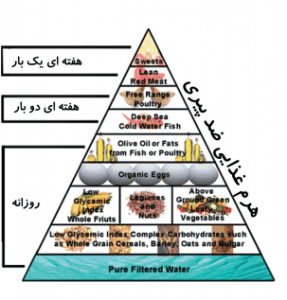Observing a proper diet for skin health
If you want to reduce the likelihood of wrinkles in your skin, you should pay attention to the following important points:
• Eat more fish, especially salmon and trout. Of course, it is important that the origin of the protein contains omega-3 fatty acids, which makes the skin shiny and prevents wrinkles.

• Replace cocoa powder with coffee; cocoa powder contains two types of leashonoids, which are antioxidants and can protect the skin against sun damage and improve blood flow in the skin, maintaining moisture in the skin so that the skin looks softer.
• Consume more fruits and vegetables;
• Never lean yourself with strict diets;
• If you have a proper and complete diet, vitamin supplements should be used that are easier to absorb. Of course, it should not be indulged in their consumption, because the high amount of some vitamins and minerals for the body is toxic.
Vitamin B family:
This family helps to grow hair, especially using vitamin B3 (50 mg), vitamin B5 (100 mg), vitamin B6 (50 mg), 3 times a day. According to the International Institute of Health, dryness and scaling of the skin are symptoms of vitamin B6 deficiency, as it is very essential for maintaining the health and elasticity of the skin. Also bumps and curvatures. Dry nails can also be caused by a lack of vitamins in this family. B vitamins help increase the blood flow of the skin and hair and reach the surface and follicles of the hair. Of course, it also helps the body against physical stress, which can cause hair damage and dark skin.
Vitamin C: It is good for overall health of the body, but it is important to be private in skin health. Vitamin C is very important in the synthesis of collagen, which is effective in maintaining skin elasticity and not creating wrinkles. Foods with more vitamin C include the citrus family. The goal is to absorb about 90mg of vitamin C per day.

Vitamin A: This vitamin regulates sebum production and maintains hair shine, moisture and softness of the skin. Vitamin A is abundant in foods such as carrots, pumpkins, sweet potatoes and broccoli. Taking large amounts of it for the body is toxic and should not be used more than 700 mcg per day. Beta-carotene, a pro predictor of vitamin A in the body, can also be supplemented. The International Nutrition and Vitamins Center recommends the necessary amount of beta-carotene to maintain body health of 10,000 to 15,000 units per day.

Vitamin A: Antioxidant is strong and protects skin cells against harmful free radicals that lead cells to aging. It is also recommended to use 200 to 400 mg doses daily, as announced by the International Nutrition and Vitamins Center. However, in some sources, up to 1000 mg per day is also recommended according to the individual’s requirements.

Filling the three main components of Stratum Corneum, i.e. ceramides and fatty acids and cholesterol, is the goal of most skin care formulations. Also, diet plays an important role in gaining skin barrier health. Fatty acids and cholesterol are obtained from dietary tarb.

